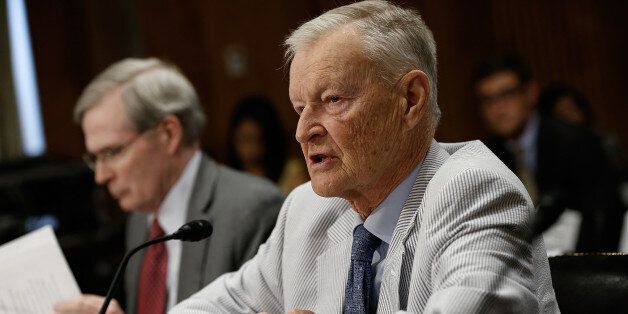Nathan Gardels is the editor-in-chief of Noema Magazine.
In Beijing on Monday, U.S. President Barack Obama called on China to be a “partner in underwriting the international order” instead of “undermining” it. One key American strategist, Zbigniew Brzezinski, who was national security adviser to U.S. President Jimmy Carter, is strongly promoting the idea that Obama’s notion should be pushed further and formalized into a “Pacific Charter.”
In this interview, I asked Brzezinski to flesh out his idea:
WorldPost: You have recently proposed a “new opening” to China and a “Pacific Charter” between the U.S. and China. What is the strategic reasoning behind this proposal at this time?
Zbigniew Brzezinski: It is dictated by global trends that point to more and more disorder across the world. It is increasingly difficult for the United States on its own to deal with this burgeoning chaos.
We are seeing today Russia’s self-assertion in Europe. By annexing the Crimea and seeking to destabilize the Ukraine, it has opened up once again the issue of territorial changes accomplished by force of arms — something that has not taken place in Europe since Hitler. The Middle East is exploding with radicalization. That can spread as it already has to Pakistan and Afghanistan and further northeast — toward China
China today is a major power, co-equal economically with the United States. It is militarily significant. And it has a major stake, just as the U.S. does, in international stability. Without stability, China’s top priority — its economic development — will be very much at risk.
So both countries have a stake in preventing the world situation from degenerating into violence and instability.
WorldPost: Are you suggesting an alliance?
Brzezinski : I am not talking about an alliance, or some dramatic joint action. I am talking about the two most important countries in the world addressing in a responsible fashion the issues that threaten both of our interests.Together that can give the world a sense of the big powers working together not only for their own well-being but for the sake of global stability.
What is needed today is the enhancement of the U.S.-China relationship that is not focused on the specific national interests of each, but on the larger agenda of stabilizing the world before the present conflicts spin so far out of control they can’t be contained. The world public needs some reassurance that we are not drifting into global chaos.
At a different historical moment, in 1941, that was the impact of the Atlantic Charter between the U.S. and Great Britain.
WorldPost; But Britain and the U.S. shared the same values of democracy and human rights.
Are China and America capable of that kind of partnership with such differing political systems?
Brzezinski : The idea of a “charter” is to indicate that this is a serious undertaking and not a set of slogans. Yes, the differences are great between the U.S. and China. But what is remarkable is that both realize that our degree of interdependence is such that if one suffers so does the other. That is a very powerful inducement for some degree of enhanced cooperation.
It would seem to me that China could play a unique role in stabilizing the Middle East, for example. The role of France and Great Britain has been damaged there by its history of colonialism. The U.S. has been severely weakened by the pre-emptive attack in Iraq and the consequent disintegration there. China, which has serious economic and energy interests in the Middle East but no political baggage, would seem to me to have a great stake in playing a role that reinforces stability there.
WorldPost: Historically, China has been the Middle Kingdom that dominated only its region through a system of tributaries. It has never had a global role. Is it up to the challenge of joining with the U.S. in such a role?
Brzezinski : China is obliged by its own interests — that now span the globe because of its large economic presence — to rise to this challenge. The fact that the U.S. and China are so important to each other makes a strong case for the proposition that we would both benefit from closer cooperation because we will both be hurt by the continuing spread of global disorder.
China recognizes the reality that there is not longer a single hegemon in the world upon which the responsibility of stability rests. Now we need a shared commitment to achieve that stability. It only makes sense that the two largest and most influential powers establish the foundation of order in which others — Europe, Japan, India, the ASEAN nations, Latin America — are, of course, included.
All can play a constructive role here, as is becoming clear as even Japan and China realize they have a greater interest in mutual stability instead of corrosive conflict.
It would be nice if the Russians could also be partners in shaping a new stability. But right now they seem bent on a form of national fanaticism.
WorldPost: What is the time frame of your thinking?
Brzezinski : The time is now. It is time to get past the usual empty bromides about some kind of cooperation in the distant future. If the world’s two top powers cannot manage to get a handle on unfolding events sooner rather than later, we all will suffer.




